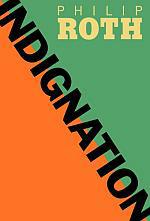Books
Roth’s Wrath

It’s not quite a twist on the level of The Sixth Sense (I read dead people?), but you may raise an eyebrow fifty-or-so pages into Indignation: our narrator is not only unreliable, he may not be corporeal. Philip Roth’s idea of the Afterlife is apparently similar to his idea of Old Age: mourn lost youth, nurse grudges, and rage bitterly over life’s unfairness, its absurdity. Indignation is redemptive, in Roth’s view.
His mouthpiece is Marcus Messner, a 19-year old college student in Ohio. He’s the son of a kosher butcher in Newark, New Jersey, a familiar Roth father-figure: terse, tough, and hard-working (In Everyman, the father was a New Jersey diamond dealer). Marcus is the picture-perfect son: straight A’s, good work ethic, good manners, dutiful to the family, and a decent ball player. A nice Jewish boy. But his father has intimations of catastrophe. He becomes paranoid about Marcus’ safety even when the boy is innocently studying at the library. Marcus becomes so frustrated and stifled by his father’s paranoia that he flees to college in Ohio…only to meet with complete catastrophe. What does Roth mean by vindicating the father’s worst fears? Is it truly about Life, “where the tiniest misstep can have tragic consequences,” as the father says? Or is the story entirely about chance, the (mis)happenstance of Fate?
Not quite. Roth sets up a few red herrings (is WASP-ish Olivia Hutton the source of Marcus’ untimely end? Or his homosexual ex-roommate?). But when the end comes, it becomes clear that Roth connected the dots back to Religion, that old enemy of Roth’s vision of paradise: free, guiltless sex liberated from any kind of commitment. So he set out to write the story of a martyr for the atheistic cause. A cultural Jew but practicing atheist (he memorizes Bertrand Russell), Marcus is indignant about having to attend chapel forty times before graduating. He hires a stand-in for the chapel requirement, is caught for the plot, expelled, and sent to the Korean War, where he is subsequently knifed like slab of meat in his father’s butcher shop. Roth’s conclusion? Marcus is a martyr because he “Couldn’t believe like a child in some stupid god! Couldn’t listen to their ass-kissing hymns! Couldn’t sit in their hallowed church! Our Folly, which art in Heaven! The disgrace of religions, the immaturity and ignorance and shame of it all!”
Roth should feel disgraced by the immaturity and shame of writing such a silly jeremiad (it goes on for about a page). Critics have politely ignored the signs of Roth’s worsening artistic arthritis. His leaden ear for dialogue results in mostly expository, on-the-nose exchanges, or else in tiresome tirades like the above quoted. Humor, a saving grace of Roth’s, is mostly absent. A Slate reviewer perfectly summed up a critic’s difficulty: “It isn’t always easy to know what is irony, what is postmodern sleight of hand, and what is literary failing.” In other words, is Roth’s humorlessly pedantic style artistic failure or is it all a postmodern joke on us, the reader? Philip Roth, the Emperor of American letters, is walking around buck-ass naked, proud as a peacock.







